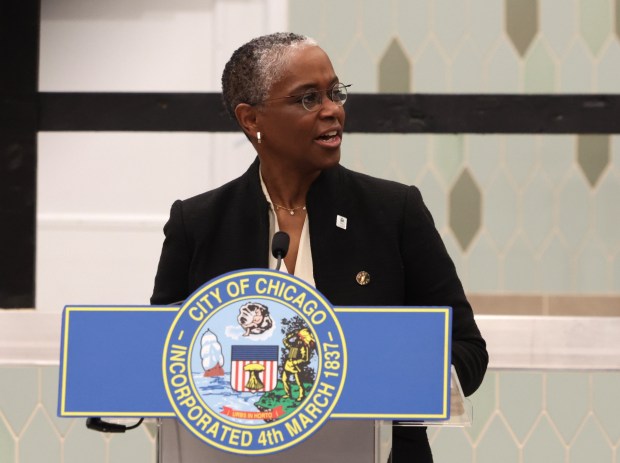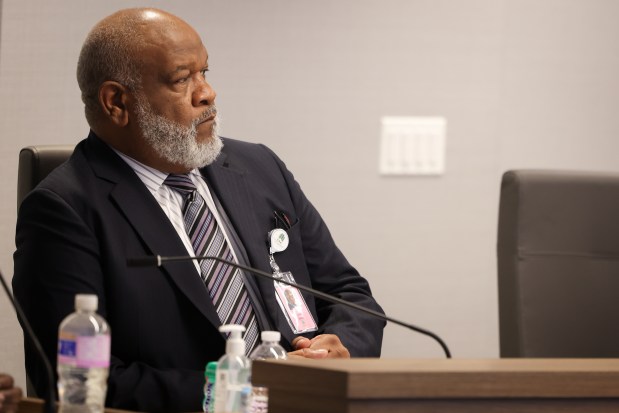Nine Chicago Housing Authority senior leaders received more than $787,000 collectively in separation agreement payouts over the last five years, including two who had received written warnings from Tracey Scott, the agency’s former CEO.
A Tribune analysis of CHA records shows that each of the nine received at least two months of compensation at the salary level they had on their last day of work. Six of the agreements were signed between August 2024 and early March 2025.
CHA “acknowledge(s) the volume of these recent transitions” and is working to “identify inefficiencies within our structure and make decisions that will best support our residents now and in the future,” said CHA spokesperson Matthew Aguilar in a statement to the Tribune. CHA did not respond to questions and instead provided the statement, saying it could not comment on specific personnel matters.
CHA has been bleeding staff in recent months, with eight high-ranking officials having left the agency since August, including one who was fired. As it reckons with the departures of these senior leaders and searches for a new CEO, the agency has launched a series of initiatives for 2025, including moves meant to increase housing and safety for residents.
“The Chicago Housing Authority is undergoing a period of renewal which includes considerable organizational restructuring to ensure accountability and better alignment with public expectations,” CHA said in the statement. “These personnel changes, whether voluntary, mutual, or based on organizational needs and/or performance expectations, ensure the agency is effectively structured to fulfill its mission and responsibilities to the public.”
Ald. Matt Martin, 47th, who chairs the City Council’s Committee on Ethics and Government Oversight, called the payouts “concerning,” particularly the deals with the two individuals who had written warnings.
“This does not make sense to me,” Martin told the Tribune, saying he wants to know if this is standard practice with housing agencies in other cities. “Regardless, why is this in the best financial interest of CHA? … Why are you paying people over $50,000 to leave, especially when the circumstances for their departures are potentially dubious?”
Ralph Martire, executive director of the Center for Tax and Budget Accountability, said while an agency such as CHA might have to occasionally make a separation payment to an employee, the amount of turnover in such a short period of time at the public housing authority suggests “there is something going on in the environment there that is not productive.”
CHA declined to provide the exact dollar amount of severance payouts collectively and for each employee. The Tribune was able to calculate approximate amounts based on the language of the agreements and other public records.
Eric Garrett, CHA’s chief operating officer until his resignation Jan. 3, who had been with the agency for 26 years, received 20 weeks of severance pay, according to his separation agreement. The Tribune calculated that to be around $87,200 based on his most recent annual pay. Garrett oversaw a department where at least one employee was fired for breaking agency procedures, including one that cost CHA over $19,000.
Garrett received a written warning from former CEO Scott because he likely knew about some of this employee’s transgressions and did not follow CHA’s procedures to address the issues, according to a CHA Office of the Inspector General report. Scott wrote in her warning that Garrett also broke agency ethics and conflict of interest policies himself by showing “favoritism” toward the terminated employee, including by going on vacation with him. Garrett could not be reached for comment.
Ellen Harris, CHA’s former general counsel, who had been in her role for about two years, resigned in August after allegations from staff members that she created a “toxic work culture,” according to public records obtained by the Tribune. She had received a written notice from Scott for some of her actions in March 2024. Harris received roughly 3½ months of severance pay, according to her separation agreement, which the Tribune calculated to be around $63,270. Harris declined to comment.
James Bebley, who was the agency’s COO at the time of his departure in 2022, received seven months of severance pay, per his separation agreement, which the Tribune calculated to be about $129,965. Bebley had worn many hats at CHA in his tenure with the agency, which lasted from 2015 to 2022, including general counsel, chief operations officer and interim CEO. Bebley was brought back to CHA in February as interim COO. He referred the Tribune to CHA’s press office for comment.
Another sizable payout went to Bryan Land, CHA’s former chief information officer, who was employed with the agency for 40 years, according to his LinkedIn profile. Land resigned in May 2023, but his official retirement date was in January 2024. Land received, according to Tribune calculations, over $167,100 in severance pay. Land’s separation agreement included money for six months he spent serving as an adviser after resigning. It also included a payment for 80 days’ worth of Land’s salary following his official retirement date as well as a “longevity stipend.” Land could not be reached for comment.
Scott’s separation agreement — which was based on terms in her employment contract, unlike the other senior officials’ agreements — included a lump sum of $119,700, representing 20 weeks of severance pay following her departure. She received an additional $9,000 related to her health insurance coverage, according to her personnel file. Scott’s last day was Nov. 1, 2024, after about 4½ years with CHA. Scott declined to comment on her departure and other executive leaders’ exits.

In its statement, CHA said it “evaluates each personnel transition on a case-by-case basis, balancing operational needs, risk management and legal obligations.” It also called separation agreements a “standard legal tool used in public and private sectors.”
The agency said its practices comply with state and federal labor laws and are intended to protect employees and the agency. The separation agreements are covered, the statement said, by the CHA’s existing personnel budget and do not affect resident-facing programs run by the agency, which is the third-largest public housing authority in the country. The agency’s personnel costs for both 2024 and 2025 were about $77 million.
“CHA has an obligation to be responsible stewards of taxpayer resources,” the statement said.
The U.S. Department of Housing and Urban Development referred the Tribune to CHA’s board of commissioners and Office of the Inspector General.
These types of settlement agreements between public sector workers and their agencies are “becoming more common,” said Martire of the Center for Tax and Budget Accountability, as it has become more difficult to attract people to the roles due to negative press around public sector outcomes and the politics involved in the jobs.
“Now that said, there has to be accountability to taxpayers for making these kinds of payments,” Martire said. “They shouldn’t be made due to malfeasance in office, negligence in office, failure to perform up to reasonable standards in office. In the CHA’s situation … allegations of (not following procedures) and of a toxic work culture have been made.”
CHA and two of its attorneys were also recently sued by the Habitat Co., a property management and development firm that used to oversee 3,400 units of public housing for the authority, for an alleged breach of contract and legal malpractice over CHA’s handling of a lead poisoning lawsuit brought by two residents.




